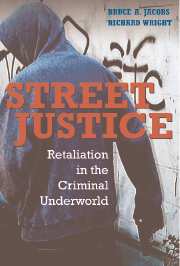1 - Background and Methods
Published online by Cambridge University Press: 05 June 2012
Summary
The skinny young drug dealer sitting across from us had been robbed at gunpoint. Someone had lobbed a brick through the passenger-side window of his car, shoved a pistol in his face, and demanded his money, drugs, and keys. He handed everything over without protest. The robber had the ups on him – what else could he do? The dealer could not see the offender's face – he was wearing a mask – but he recognized his voice and the distinctive paint-stained boots on his feet. He knows who did it. Now, he wants to get even.
The pursuit of justice animates social life. “[T]he question of what people are entitled to is fundamentally a question about what it means to be a person” (Miller 2001:545; see also Furby 1986). Is it any wonder that people are hypersensitive to infringements on what they believe should be theirs by right, and feel compelled to get even with anyone who dares to deprive them of what they regard as their just due?
The need to retaliate arises from a basic sense of injustice, the feeling that you have been unfairly subjected to a force against which you are situationally powerless to act (Marongiu and Newman 1987:9). As “gifts of negative moral value” (Miller 1993:16), injustices create imbalances that cry out for elimination. Though these injustices vary in nature and severity, all deprive grievants of the respect that they believe is owed them (Miller 2001).
- Type
- Chapter
- Information
- Street JusticeRetaliation in the Criminal Underworld, pp. 1 - 24Publisher: Cambridge University PressPrint publication year: 2006

